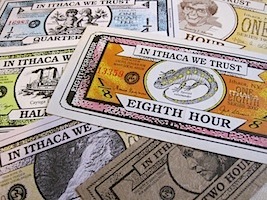




 |
 |
 |
 |
 |
| Book Review: In Sam We Trust: The Untold Story of Sam Walton and How Wal-Mart is Devouring America Bob Ortega. Times Books, 1998. by Paul Glover (originally published in Bookpress, October 1998) Sam Walton worked hard and became,by trial and much error, the man who was ready, when the postwar baby boom met consumerism and advertising science, to sell America everything. Although the supermarket and discount center had been invented decades before Walton's time, they were marginal until the broadest public was ready to abandon neighborhood shops for cheap goods. Even during the Thirties, several states levied special "chain store taxes" to protect local businesses. Some readers, for whom Wal-Mart is the gateway to paradise, or who might be inspired by the story of Sam's leadership to seek to become captains of industry, may be attracted to Walton's combination of brutality and geniality. There's appeal in the raw struggle to dominate as effectively as Walton has. Founded in 1962, Wal-Mart became by 1988 the most profitable retailer in the world, after decades of turf wars with Kresge, Kroger's, Woolworth's and others. That year Walton managed the largest privately-owned satellite system in the country, enabling efficient movement of inventory. By 1992 every Wal-Mart thermostat in the nation was controlled from Bentonville, Arkansas. Wal-Mart is expected to become the largest corporation in the world by about 2005. Author Bob Ortega was the Wall Street Journal's Wal-Mart reporter for five years. His book is important to Ithaca because Wal-Mart's current bid to occupy Lansing's Pyramid Mall would scramble local retailing and, as a regional magnet, spark a 40% traffic increase there. "Wal-Mart, like any corporation, is merely a machine, an impersonal construct with one imperative: the profit motive," says Ortega. Pursuing that motive to the utmost might damage Tompkins County rather than make life easier here. Although this book's chapters move chronologically from Walton's ancestry through his childhood to shopkeeping and empire, one could as well open it at random, browsing to encounter the lessons it offers. Right here in the middle, on page 204 for example (an actual random shot), we find Wal-Mart's "Made in USA" promotion unravelling as the public realizes that most Wal-Mart goods were actually imported by the U.S. companies which sell to Wal-Mart. Wal-Mart long resisted stockholder resolutions to end contracts involving slave labor (allegations by China's Harry Wu) and mistreatment of women, minorities, and children as young as seven. Even now their labor "code" is weak and feebly enforced. Commonplace practices of 14-hour days, forced overtime, locked bathrooms, violation of minimum wages (if any), firing or killing union organizers, beatings, and rapes keep Wal-Mart's prices low ("Breaking the Code" chapter 15). Even domestically, Wal-Mart was forced by federal court order to declare themselves an equal opportunity and affirmative action employer (NYT 4/20/93). The harsh truth is that, since shopping is voting, we are slave owners when we buy the products of slave labor. Nonetheless, some readers might drive straight to Cortland, or Binghamton, or Elmira, or Geneva, or Auburn where, thanks to Walton's marketing genius, underpants are available made by child and slave labor, costing ten cents less than anywhere else. We need cheap necessities, yes, but what is necessary? What else is life for? Malls are more than practical in this dismal way, they are America's playpen. Reassured by TV that the purpose of life is shopping, an American's prime rite of passage may be the first credit card purchase. Workers earn dollars often by doing work they don't like, justifying dull or unpleasant labor by spending credits to buy what they don't need. Spending gives at least an illusion of power. And there's a lot of pressure to do so: everything in the U.S. is subordinate to shopping. Without money and ownership of the stuff with which to prove you've got money, one has little status. |
When big boxes are not abandoned (Wal-Mart closes less profitable
stores) they provide jobs, shifted from smaller stores that could not
compete. A Massachusetts study says a typical Wal-Mart adds 140 jobs
and destroys 230 higher-paying jobs (Donella Meadows, professor,
Dartmouth). Another case study, of Donaldsville, Louisiana, found store
closings jump from an average four per year to 18 per year during the
ten years after Wal-Mart came to town. The Draft Environmental Impact Statement for the Wal-Mart proposed for Ithaca in 1992 said, "Because there is no obvious source of unmet retail demand by the local population... a greater portion of the Wal-Mart's projected sales would need to be captured from existing area stores" (p. 5). As Ortega sees it, "[Wal-Mart's] success with bigger and bigger boxes spawned the category-killer chains that continue to crush smaller businesses and to ensure that every town eventually will have exactly the same selection of books, videos, records, magazines, clothing, food, toys, hardware, and everything else..." Ortega tells stories of retailers improving their stores as recommended by consultants/offering extra service, longer hours, goods Wal-Mart doesn't carry/but failing anyway. Ortega's main focus is Wal-Martas labor impact, with economic impact secondary, but he seldom mentions environmental issues. This chain, like McDonaldas, has become "a metaphor for the American dream run amok," according to Peter Calthorpe, an urban designer from San Francisco. Ortega quotes John Jarvis, an anti-Wal-Mart leader in Lancaster, Pennsylvania: "The good thing about Wal-Mart was that it was big enough, nasty enough, and aggressive enough to make the problem of uncontrolled growth clear." Nor is Ortegaas book a manual for opposing Wal-Mart. For that we turn again to Ithaca, which stopped Wal-Mart after a three-year campaign. Ortega dedicates a chapter ("Bambi Beats Godzilla") to Ithaca and related successful efforts. But these stories are more anecdotal than instructive. The Greenfield (MA) Community Preservation Coalition stopped Wal-Mart by defying their city councilas 19-7 vote favoring Wal-Mart, to force a referendum. They campaigned on the theme that "You can't buy small-town life at a Wal-Mart. You can only lose it there," and they defeated Wal-Mart 2,854 to 2,845. Wal-Mart failed in Ithaca principally because of their special talent for targeting outstanding natural areas (like the entrance to Buttermilk Falls), and because of effective community organizing. The Stop Wal-Mart group brought 190 people to public hearings, leaned on the mayor during an election year, and threatened to give Wal-Mart worse national publicity than it has encountered anywhere else. Above all, Stop Wal-Mart relied on the gut instincts of people who care deeply about Ithaca, who regard themselves more as creative producers than as consumers, and who seek to preserve Ithaca's rare mix of big city (many ethnic groups, talents, cultural activity) and small town (surrounded by forest and seasons and waterfalls). The Citizen's Planning Alliance (led by current mayoral candidate Dan Hoffman) arose from this campaign, to ensure that the expansion of Ithacaas tax base enhances rather than erodes Ithaca's social base. Some local politicians, dedicated fixedly to City Hall revenue alone, continue to ignore these concerns. Mayor Cohen and much of the Council, the most conservative in 30 years, appeal to our blandest sensibilities. They would have us believe that Wal-Mart is Reality; that this is a tough world and that there's no alternative but to reduce the community base to enlarge the tax base. But there are alternative realities. Rather than pursuing the Wal-Marts, Wegmans and K-Marts of the land, we could develop market niches for regional manufacture, for regional sales of durable goods, for local entertainment and employment, including worker ownership. Ithaca can be made rich by plugging leaks in the local economy. Food, fuel, housing, transportation, medical care, solid waste, and every other need can be met extensively by generating local networks and using new technologies, rather than by chronic import. There are thousands of jobs to be made here for us and our youngsters through this process. You name it-- from salsa and pasta to clothes and furniture, from nonprofit health clinics and medications, from superinsulation to wind and solar power, from systematic recapture of student discards to remanufacturing and flexible manufacturing networks-- we can develop locally-controlled enterprise which serves us directly and exports as well. This genuine development, often referred to as "smart growth," can be Ithaca's better destiny. Ithacans need not settle for just another row of big boxes beside just another highway. We can explore dynamic new directions, set examples, and make our town more beautiful, safer, and in the long run economically more viable than communities which have sacrificed their independence and diversity for the false security offered by Wal-Mart. |
| HOME | INTRO | CURRENCY | SUCCESSES | HOW-TO BOOK | PUBLICITY | ESSAYS |